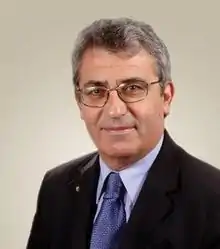Evarist Bartolo
Evarist Bartolo (born 14 October 1952) is a Maltese politician within the Labour Party and he is currently Minister for European & Foreign Affairs. He was also Minister for Education & Employment. Bartolo was born on 14 October 1952 in Mellieha. He has been a member of the Maltese Parliament since 1992. In the general elections held on 9 March 2013 he was once again elected from two districts, the 10th (Gzira, Pemboke, Sliema, St Julians) and the 12th (Mellieha, St Paul's Bay and Naxxar).
Evarist Bartolo | |
|---|---|
 | |
| Minister for European and Foreign Affairs | |
| Assumed office 15 January 2020 | |
| Prime Minister | Robert Abela |
| Preceded by | Carmelo Abela Responsible for Foreign Affairs & Trade Promotion |
| Minister for Education and Employment | |
| In office 13 March 2013 – 15 January 2020 | |
| Prime Minister | Joseph Muscat |
| Preceded by | Dolores Cristina |
| Succeeded by | Owen Bonnici |
| Member of Parliament | |
| Assumed office 4 April 1992 | |
| Minister for Education and National Culture | |
| In office 28 October 1996 – 6 September 1998 | |
| Prime Minister | Alfred Sant |
| Preceded by | Michael Falzon |
| Succeeded by | Louis Galea |
| Personal details | |
| Born | 14 October 1952 Mellieħa, Malta |
| Nationality | Maltese |
| Political party | Labour (PL) |
| Spouse(s) | Gillian |
| Children | Katrine, Louisa |
| Profession | Lecturer Journalist |
| Website | www.evaristbartolo.com Partit Laburista |
Family
Bartolo has three brothers and three sisters. His father worked as a primary school teacher. He is married to Gillian (née Sammut) and they have two children, Katrine and Louisa.
Education
In 1975 Bartolo graduated from the University of Malta with a B.A.(Hons) degree in English Literature. In 1984 he was awarded a scholarship for a diploma course in journalism at Stanford University. He then read for a Master's in Education at the University of Cardiff which he completed in 1986.
Career
Bartolo spent three years teaching at De La Salle College, another four years at the national broadcasting station and then a further ten years as the editor and head of news of the Labour Party media. He currently lectures in Communication Studies at the University of Malta. He has been a member in parliament since 1992, working mostly in education, European affairs and tourism. Between 1996 and 1998 he served as Minister of Education and National Culture under a Labour Government.
Political beliefs
Bartolo was raised in Mellieha, a conservative, rural town in the north of Malta. As he himself points out, he had a very Catholic upbringing and as a teenager used to teach the Bible to younger children. He was also very active in the Legion of Mary, the Catholic Action and the Young Christian Workers, all of these movements closely aligned to the Catholic Church. In a country where political polarization is very strong and most individuals will identify with the party that they have been brought up with, Bartolo describes himself as one of those who chose a party upon the basis of an explicit attempt to understand which party best stood for the principles that he believed in. Bartolo states that the road that convinced him that his place was within the Labour Party was a long tortuous one during which he explored Karl Marx, Mahatma Gandhi, Vladimir Lenin, Martin Luther King Jr. and spent a year in Sicily working with an anti-Mafia activist Danilo Dolci.[1]
Bartolo is a prolific writer having been a consistent contributor to the local media since his early teens and is considered to be one of the principal ideologists within the Malta Labour Party.
Bartolo was one of the leading contenders for the Malta Labour Party leadership following the resignation of Alfred Sant who had been at the helm of the Party since 1992.
Bartolo's moderate beliefs are seen by many as being the sort of views which will move the Labour Party from being perceived as a slightly outmoded traditional working class party to one that, within the new Maltese social realities, captures the support of emerging liberal elements within the middle classes while still remaining loyal to its working-class roots.[2]
In August 2013, Bartolo nominated Cyrus Engerer within the Labour Party for the 2014 European Parliament elections.
References
- http://www.evaristbartolo.com
- Ltd, Allied Newspapers. "'I'm Evarist Bartolo, not Alfred Sant'".
External links
| Wikimedia Commons has media related to Evarist Bartolo. |
